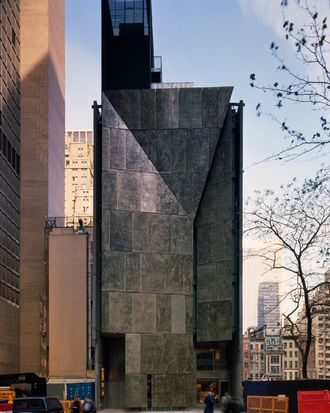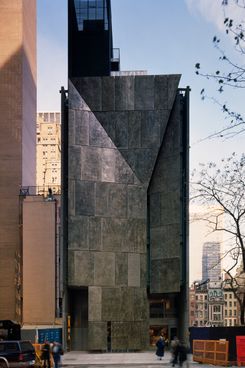

Last night, the American Folk Art Museum ÔÇö that beloved, bedeviled museum on West 53rd Street ÔÇö confirmed what many of us had feared for years. It is in such deep debt and has such low attendance numbers that it will sell its building and relocate back to a lobby space one sixth its current size near Lincoln Center. Sad as it is to say, this news comes as no surprise, and the culprit is the museumÔÇÖs physical home.
Despite the many rave reviews the 30,000-square-foot building received when it opened in December 2001, it was immediately clear to many that the building was not only ugly and confining, it was also all but useless for showing art ÔÇö especially art as visionary as this museumÔÇÖs. In the past decade, AFAM has mounted shows of some of the greatest artists of the twentieth century, including Martin Ramirez, Henry Darger, Adolf Wolfli, and Thomas Chambers. Yet from the outside it looked like a bronzed Kleenex box or a miniature suburban professional building. The inside was worse. Dominated by showy staircases of many scales going in different directions, ill-conceived nooks and niches, the galleries were long narrow corridors or landings, sometimes only a few feet wide, making it impossible to see the art. The largest exhibition spaces had the look of a gloomy cloakroom. The architects responsible for this utter lack of imagination and hubristic mess of starchitectural vanity, Tod Williams and Billie Tsien, were praised for their intelligent use of materials. The building was called astonishing, a shrine, a temple, a Zen masterpiece. In reality, every one of their decisions reflected a total lack of feeling for, even a disdain for, art. Before he died, the Times architectural critic Herbert Muschamp, whoÔÇÖd said nice things about the building when it opened, confided to me that my loathing was ÔÇ£probably right.ÔÇØ
This terrible building will be sold to MoMA for an undisclosed sum. I can only imagine that MoMA will use the building for office space ÔÇö perhaps freeing up much-needed room for its own sorely cramped permanent collection ÔÇö or tear it down and start again.
We may be at the beginning of a long period of undoing, of rebuilding or destroying architectural failures. In the years to come, those who oversaw and built many new museums and museum wings will have much to answer for. During a period when the West accumulated more wealth than at any time in the history of the world, a vast amount of ill-conceived space for art was constructed, as institutions wasted their energy on atriums and useless entertainment areas. Books and dissertations will be written, panels will be convened, ridicule will be heaped, as our descendants look back at these atrocious buildings and wonder how so much went so wrong. The American Folk Art Museum will probably be the first to be razed, and not the last.
[Update: Now read NY Mag architecture critic Justin DavidsonÔÇÖs rebuttal: Jerry Saltz Has It All Wrong About the American Folk Art Museum]

